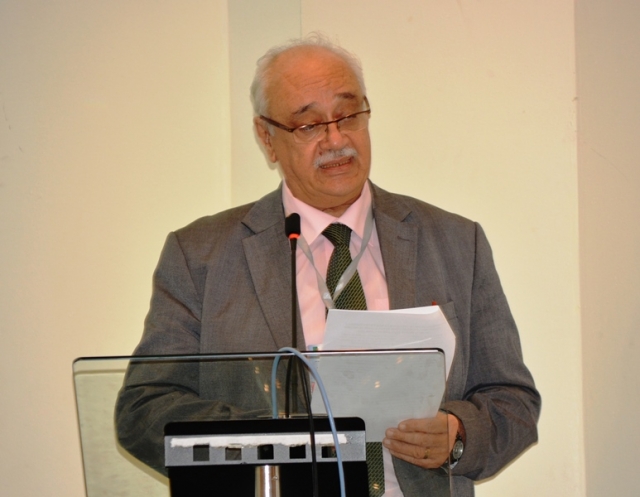The heads of delegation of Members States of the World Health Organization (WHO) African Region adopt the Algiers’s Call to Action for tobacco control
 Brazzaville/Algiers, 19 October 2016 - The heads of delegation of Member States of the World Health Organization (WHO) African Region adopted the Algiers Call to Action for Tobacco Control at the end of the high-level meeting on the implementation of the WHO Framework Convention on Tobacco Control (WHO FCTC).
Brazzaville/Algiers, 19 October 2016 - The heads of delegation of Member States of the World Health Organization (WHO) African Region adopted the Algiers Call to Action for Tobacco Control at the end of the high-level meeting on the implementation of the WHO Framework Convention on Tobacco Control (WHO FCTC).
This meeting came ahead of the seventh session of the Conference of Parties to the WHO FCTC (COP7), to take place on 7-12 November 2016 in Delhi, India.
While welcoming the significant progress made to date in the implementation of the WHO .FCTC and the increasing number of member states in the African Region ratifying the Protocol to Eliminate Illicit Trade in Tobacco Products, the participants noted that national implementation of the WHO FCTC continues to present major challenges, and that tobacco use continues to hamper the sustainable development of countries in the Region.
Recalling the Addis Ababa Action Agenda of the Third International Conference on Financing for Development, the Nairobi Declaration on the implementation of the WHO FCTC in the African Region (2015) and the Kinshasa Call to Action to accelerate the implementation of the WHO FCTC for the achievement of the Sustainable Development Goals (2015), this Algiers Call to Action calls on all tobacco control stakeholders to take urgent and meaningful actions to address the challenges of implementation at national and regional levels.
In the Algiers Call to Action, delegates particularly urge Member States in the African Region to:
- accelerate the development, strengthening and implementation of laws for tobacco control that fully incorporate the obligations of the WHO FCTC, its Protocol and Guidelines and use global best practices in tobacco control at country level;
- implement effective financial and fiscal policies, including uniform specific tax and use part of the tax levied to promote tobacco control and help achieve the Sustainable Development Goals;
- develop and implement coherent national strategies to promote tobacco control and public health in the context of international trade and investment;
- accelerate the accession or ratification of the Protocol to eliminate illicit trade in tobacco products and initiate multisectoral national legal and institutional measures for its implementation;
- accelerate regional and global cooperation and collaboration with other WHO Member States, international organizations and other non-state actors, excluding the tobacco industry, to support the effective implementation of the WHO FCTC;
- institutionalize the evaluation and monitoring of tobacco control policies to monitor and facilitate the implementation of the WHO FCTC.
The Algiers Call to Action also calls on the World Health Organization and the WHO FCTC Secretariat to continue to mobilize and provide effective technical support to Member States in the Region in the context of tobacco control. It sends a special invitation to the African Union and other regional and sub-regional economic integration organizations in Africa, to provide more support to the implementation of the WHO FCTC and the Protocol to Eliminate Illicit Trade in Tobacco Products.
The Algiers Call to Action calls upon the United Nations, the various intergovernmental partners and non-state actors, excluding the tobacco industry and its affiliates, to mobilize and increase the financial, technical and other resources, including through South–South cooperation, to fully implement the WHO FCTC in the African Region.
Finally, the Algiers Call to Action recommends that the World Health Organization explore ways and means for the establishment of an African Tobacco Control Fund, to support the implementation of the WHO FCTC and the achievement of the Sustainable Development Goals in the African Region.
_________________________________________
For more information, please contact:
Technical issues
Dr Ahmed OUMA, Regional Advisor for Tobacco Control, WHO Regional Office for Africa, Brazzaville, Republic of Congo. Tél.: +242 06 508 11 08, Email: oumae [at] who.int (oumae[at]who[dot]int)
Dr Nivo Ramanandraibe, Technical Officer, WHO Regional Office for Africa, Brazzaville, Republic of Congo. Tél.: + 47 241 39371, Email: ramanandraiben [at] who.int (ramanandraiben[at]who[dot]int)
Dr Lylia OUBRAHAM, NPO Non Communicable Diseases. Tél.: +213 (0) 660 20 51 91, Email : oubrahaml [at] who.int (oubrahaml[at]who[dot]int)
Dr. Youcef TARFANI, Director of Non Communicable Diseases, Ministry of Health, of the Population and of the hospital reform. Tél.: +213 (0) 771 69 09 44, Email: ytarfani [at] yahoo.fr (ytarfani[at]yahoo[dot]fr)
Media
Collins BOAKYE-AGYEMANG, Regional Communications Adviser a.i., WHO Regional Office for Africa, Brazzaville, Republic of Congo, Tel.: +242 06 520 65 65, Email : boakyeagyemangc [at] who.int (boakyeagyemangc[at]who[dot]int)
Fabienne ABOUA, Communication Officer, WHO Regional Office for Africa, Brazzaville, Republic of Congo. Tel.: +242 05 662 75 68, Email : abouaf [at] who.int (abouaf[at]who[dot]int)
Leila CHIBOUT, NPO Health Promotion, Algeria. Tél. : + 213 (0) 665 14 63 87, Email : chiboutl [at] who.int (chiboutl[at]who[dot]int)
Slim BELKESSAM, Adviser for Communication, Ministry of Health, of the Population and Hospital Reform. Tél. : +213 (0) 661 55 79 66, Email : mbelkessam [at] sante.gov.dz (mbelkessam[at]sante[dot]gov[dot]dz)


